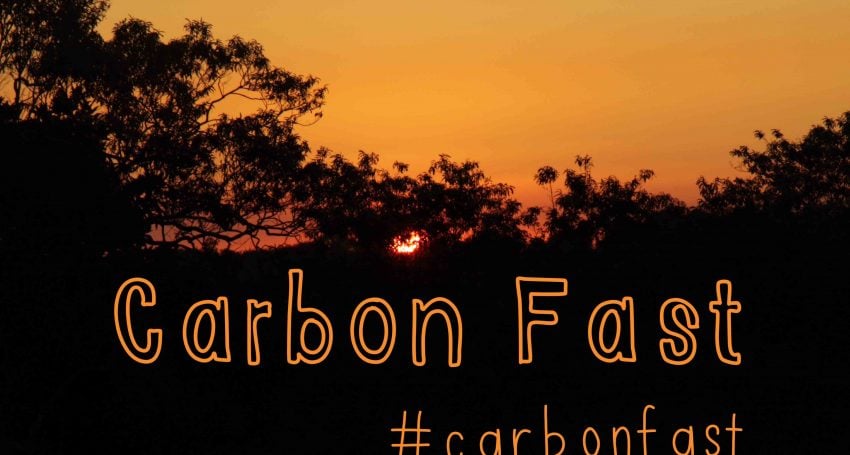Carbon fast and prayer for Lent
Features
Join other local Anglicans, like Justice Unit Coordinator Jen Basham, and do a carbon fast this Lent: “Together, taking small but important actions, we can dramatically reduce our carbon pollution”

On Good Friday four years ago, a group of Anglican Bishops from around the world called for urgent action on climate justice. In The World Is Our Host, they wrote:
“At this time of unprecedented climate crisis, we call all our brothers and sisters in the Anglican Communion to join us in prayer and in pastoral, priestly and prophetic action. We call with humility, but with urgent determination enlivened by our faith in God who is Creator and Redeemer and by the pain of our people’s experience in our dioceses and provinces, and their need for seeds of hope.”
Advertisement
They also called upon the “political, economic, social and religious leaders in our various constituencies to address the climate change crisis as the most urgent moral issue of our day.”
In Australia the need for action is more pressing and urgent than ever. We have just experienced a horror summer; our rainforests near Mackay were burning from fires rated as ‘catastrophic’ (a category that didn’t exist prior to Black Saturday), and Tasmania and northern NSW subsequently experienced similarly devastating wildfires. Townsville is recovering from unprecedented flooding, even as other parts of Queensland remain parched and drought declared. The Torres Strait Islands are being swamped by rising saltwater, and our precious Great Barrier Reef is under tremendous strain from the cumulative impacts of rising sea temperatures and flood runoff. The Climate Councils new report Weather Gone Wild, is clear that these extreme weather events are being fuelled by changes to the climate.
The World is Our Host called for all Anglicans to join in monthly prayer and fasting, to commit to transforming their own lives and to advocate for change.
In Australia, we are one of the highest carbon polluters per person of all developed countries.
This Lent, we ask you to take time to consider again this urgent message.
Together, taking small but important actions, we can dramatically reduce our carbon pollution.
Together, we can call for urgent action from our leaders.
This call cries out to the very heart of our shared Anglican mission – to safeguard the integrity of creation and sustain and renew the life of this earth.
Some resources to assist:
- Pray and fast for the Climate (UK)
- Just Earth – a new Lenten study app
- The Anglican Communion Environment Network (ACEN) has a range of climate justice resources
Carbon fast for Lent
Consider following these steps during the 40 days of Lent. Integrate these changes to permanently reduce your own carbon footprint.
1. Food
Our food choices have a profound effect on the environment. By choosing to consume fewer animal products (quality over quantity), we can reduce methane and carbon emissions from livestock and decrease our food miles. By purchasing direct from farmers or paying a fair price for fresh produce, we can also help to ensure more sustainable farming practices, and contribute to food security over the longer term.
- Choose local and ethically-farmed products.
- Source sustainable fish using guides
2. Energy
Energy is the largest source of climate pollution in Australia. You can reduce energy consumption by switching off or limiting air conditioning and dryers, and making sure electrical devices throughout the home are switched off. Consider switching your energy plans to companies or products that are based on clean, renewable energy.
- Ditch the car when you can, and use public transport, walk or ride
- Raise awareness by joining Earth Hour on 24 March
3. Water
Despite being the driest continent, Australians are one of the greediest consumers of water. Water efficiency saves energy, reducing carbon emissions. To save water, try taking shorter showers, installing water-efficient shower heads, installing rain water tanks, limiting lawn sizes and only planting native plant species.
- Mark World Water Day on 22 March
- Take less than three-minute showers
4. Waste
Instead of sending food scraps to landfill, you can significantly reduce your carbon footprint by composting, building a worm farm, or using an anaerobic digester. You can also save making sure you are recycling plastics, paper, glass, batteries and many other ‘disposable’ products.
- Join the war on waste
- Trying going plastic free
5. Plants
Plants are the lungs of the earth. Our remaining forests and woodlands are also critical for the health and productivity of our lands and waters. Yet Australia’s land clearing rates are again amongst the highest in the world.
- Plant a tree or join a community garden
- Carbon offset your use of cars or planes, or financially support a revegetation project





